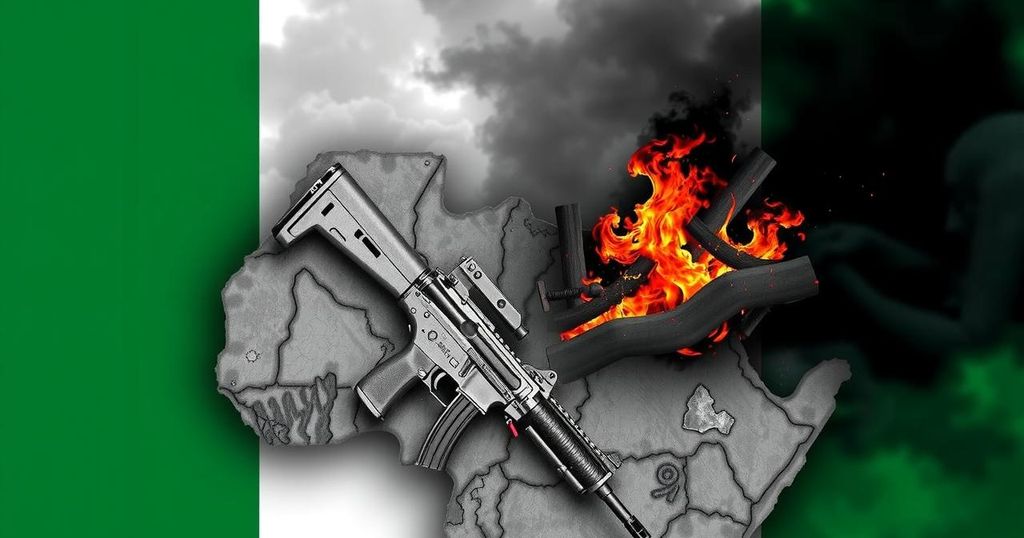The Nigerian Civil War: A Comprehensive Overview
The Nigerian Civil War (1967-1970) was a devastating conflict between Nigeria’s federal government and the secessionist state of Biafra, rooted in ethnic tension and economic disparities. This war resulted in between 500,000 to 3,000,000 deaths and concluded with the reintegration of Biafra into Nigeria. The historical context underscores the fragility of Nigeria’s socio-political landscape, revealing enduring challenges to ethnic harmony and governance in the region.
The Nigerian Civil War, also known as the Biafran War, occurred from 1967 to 1970 between Nigeria’s federal government and the secessionist state of Biafra. Numerous factors, including ethnic strife, economic disparities, and educational inequities, paved the way for this catastrophic conflict, which resulted in a staggering death toll estimated between 500,000 to 3,000,000 individuals. The historical context leading up to the war reveals a Nigeria that achieved independence on October 1, 1960, with Abubakar Tafawa Balewa serving as the initial federal prime minister. Subsequent political turmoil and ethnic rivalries heightened tensions, exacerbated by a controversial census in the early 1960s and a series of regional divisions aimed at curbing these conflicts. The situation deteriorated significantly when, in January 1966, a coup led to the assassination of several political leaders, including Balewa. This event further divided the military along ethnic lines and led to additional coups, notably one in July 1966 that established Lieutenant Colonel Yakubu Gowon as head of state. Despite attempts to rectify Nigeria’s political course through conferences, the situation only worsened, culminating in the demand for a sovereign republic by Colonel Odumegwu Ojukwu, a key figure representing the Eastern region (primarily Igbo). On May 30, 1967, Biafra was declared, prompting the onset of armed conflict within weeks. Initial successes by Biafran troops soon faltered against federal forces, resulting in a protracted and bloody struggle that saw untold civilian suffering, starvation, and military stalemate. Various international factions became involved, with countries offering support to both sides. The Biafran forces ultimately collapsed by January 1970, leading to Ojukwu’s flight to Côte d’Ivoire and a formal surrender shortly thereafter. The aftermath of the war saw the reintegration of former Biafran territories into Nigeria under Gowon’s leadership, characterized by efforts to promote reconciliation and development. However, the war’s legacy continued to influence Nigeria’s political landscape, including a shift towards civilian rule by 1979 following a succession of military leaders.
The Nigerian Civil War, which unfolded from 1967 to 1970, rooted its origins in the complex interplay of ethnic rivalry, economic inequality, and the legacy of colonial rule. Following Nigeria’s independence in 1960, socio-political unrest brewed beneath the surface, aggravated by contentious census results and subsequent regional divisions. The central government’s perceived favoritism towards certain ethnic groups, particularly the Hausa-Fulani in the north, incited deeper divisions and sense of agitation among the Igbo people of the east. This unrest was further exacerbated by failed political negotiations and military coups, leading to a detrimental spiral toward violent confrontation after the declaration of the Republic of Biafra. The war not only reflected the intricacies and fragility of Nigeria’s ethnic relations but also highlighted global geopolitical dynamics, as various nations provided military aid and support to the conflicting parties.
The Nigerian Civil War stands as a significant chapter in the nation’s history, illustrating the severe consequences of ethnic division and political instability. The conflict resulted in considerable loss of life and suffering, fundamentally altering Nigeria’s political landscape. Post-war efforts for reconciliation and development set the stage for future governance; however, the lessons from this conflict continue to resonate within contemporary Nigerian society and politics, emphasizing the need for persistent dialogue and unity among its diverse populations.
Original Source: www.britannica.com








Post Comment